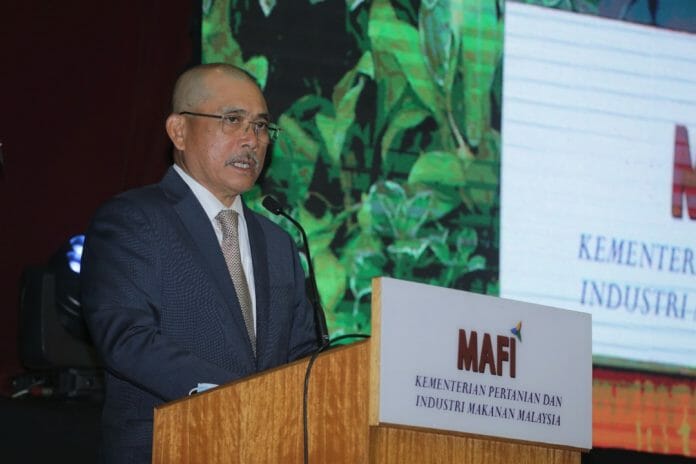In line with efforts to realise the Government’s aspiration towards a corruption-free country, Ronald Kiandee, the Minister of Agriculture and Food Industries (MAFI) launched the Kalam Anti Rasuah MAFI (KARMA 2021-2025).
The Ministry’s anti-corruption document with the vision – “The Leader of Agriculture and Integrity Food Industry, Transparent and People-Friendly” to ensure the continuos implementation of the National Anti-Corruption Plan (NACP).
The contribution of agriculture, especially the agro-food sector to the economy can be seen in the record of a positive Gross Domestic Product (GDP) growth in the third quarter of 2020. It recorded a growth of 1.1 percent although the country’s GDP as a whole was contracted due to economic uncertainty due to the pandemic.
There is no denying that the agro-food industry has faced great challenges, especially in the early stages of the implementation of Movement Control Order (MCO) where the smoothness of the food chain is disrupted among the production, distribution, and retailing of agricultural products and food industry.
“The Government with the cooperation of all responsible parties has ensured that the situation is always under control and we have ensured that food for the people is in adequate condition and stable.
The agriculture and food industry sectors have been placed as a necessary service and have been allowed to operate full time during the whole MCO from the early stages until now.
We are not free from this Covid-19 threat and must continue to ensure the food chain and security for the people under any circumstances,” Ronald highlighted.
He also mentioned the successful events of the Ministry in 2020 which include:
- Establishment of the National Food Security Policy Cabinet Committee (FSCC) to examine issues related to food security in a comprehensive and holistic manner
- Implementation of the National Food Security Policy, a specific action plan to strengthen national food security by taking into account issues and challenges along the food supply chain.
- Approved amendments to the Farmers’ Organisation Regulations 1983 to restore the power to elect farmers’ leadership to their own farm members as it used to be. The new Farmers Organisation (Amendment 2020) Regulations have come into force from January 1, 2021.
- Improving the legal rice seed distribution process with new initiatives including the appointment of the National Farmers Organisation (NAFAS) as the sole wholesaler in the legal rice seed initiative programme as well as setting the price of the legal rice seed ceiling at RM35 per bag.
- Allocated RM640 million through the Pakej Rangsangan Ekonomi (PRE) 2020, the Pakej Rangsangan Ekonomi Prihatin Rakyat (PRIHATIN), and the Pakej Jana Semula Ekonomi Negara (PENJANA) to boost the agriculture-based industry as well as to enable those affected to continue to survive their respective enterprises.
- The implementation of the Kebuniti Agriculture Project has also received good response from the Malaysian community. This programme helps reduce the cost of living, provide employment opportunities, and assist in ensuring food safety, especially to urban and suburban residents. (For the year 2021, this initiative will be continued with an allocation of RM30 million under the Kebuniti 2.0 Programme. This will provide greater benefits to the people, especially to the B40 group.)
- Has assisted 1,149 young agropreneurs with total assistance of RM21.74 million (78 percent of grant recipients have managed to increase their income from RM500 to RM5,000 per month and as many as 20.7 percent have been able to increase their income by more than RM5,000 per month)









